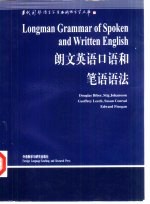图书介绍
朗文英语口语和笔语语法PDF|Epub|txt|kindle电子书版本网盘下载

- (英)Douglas Biber等著;陈国华导读 著
- 出版社: 北京市:外语教学与研究出版社
- ISBN:7560020119
- 出版时间:2000
- 标注页数:1209页
- 文件大小:53MB
- 文件页数:1248页
- 主题词:英语(学科: 语法) 英语 语法
PDF下载
下载说明
朗文英语口语和笔语语法PDF格式电子书版下载
下载的文件为RAR压缩包。需要使用解压软件进行解压得到PDF格式图书。建议使用BT下载工具Free Download Manager进行下载,简称FDM(免费,没有广告,支持多平台)。本站资源全部打包为BT种子。所以需要使用专业的BT下载软件进行下载。如BitComet qBittorrent uTorrent等BT下载工具。迅雷目前由于本站不是热门资源。不推荐使用!后期资源热门了。安装了迅雷也可以迅雷进行下载!
(文件页数 要大于 标注页数,上中下等多册电子书除外)
注意:本站所有压缩包均有解压码: 点击下载压缩包解压工具
图书目录
SECTION A Introductory1
1 Introduction:a corpus-based approach to English grammar3
1.1 Introduction4
1.2 Structure and use in English grammar6
1.3 Varieties of English15
1.4 Representation of varieties in the LSWE Corpus24
1.5 Description of the register categories in the LSWE Corpus29
1.6 Grammatical analysis of the LSWE Corpus35
1.7 Quantitative findings in the grammar38
1.8 Functional interpretation of quantitative findings41
1.9 Overview of the grammar44
1.10 Potential users and uses of the LGSWE45
SECTION B Basic grammar:description and distribution47
2 Word and phrase grammar49
2.1 The nature of grammatical units50
2.2 Words and their characteristics51
2.3 Survey of lexical words62
2.4 Survey of function words69
2.5 Survey of inserts93
2.6 Phrases and their characteristics94
2.7 Types of phrase96
2.8 Embedding of phrases113
2.9 Coordination of phrases113
2.10 Simple v.complex phrases117
3 Clause grammar119
3.1 Clause v.non-clausal material120
3.2 Major clause elements122
3.3 Clause links134
3.4 Peripheral elements136
3.5 Major clause patterns141
3.6 Variations on clause patterns152
3.7 Ellipsis156
3.8 Negation158
3.9 Subject-verb concord180
3.10 Types of dependent clauses192
3.11 Finite dependent clauses193
3.12 Non-finite clauses198
3.13 Major types of independent clauses202
3.14 Unembedded dependent clauses223
3.15 Non-clausal material224
SECTION C Key word classes and their phrases227
4 Nouns,pronouns,and the simple noun phrase229
4.1 Overview of nominals in discourse230
4.2 The basic structure of noun-headed phrases240
4.3 Types of nouns241
4.4 Determiners258
4.5 Number284
4.6 Case292
4.7 Gender311
4.8 Noun formation318
4.9 The role of pronouns in discourse327
4.10 Personal pronouns328
4.11 Possessive pronouns340
4.12 Reflexive pronouns342
4.13 Reciprocal pronouns346
4.14 Demonstrative pronouns347
4.15 Indefinite pronouns351
4.16 Other pronouns355
5 Verbs357
5.1 Major verb functions and classes358
5.2 Single-word lexical verbs360
5.3 Multi-word lexical verbs403
5.4 Main and auxiliary functions of primary verbs428
5.5 Copular verbs435
6 Variation in the verb phrase:tense,aspect,voice,and modality451
6.1 Structure and meaning distinctions in the verb phrase452
6.2 Tense453
6.3 Aspect460
6.4 Active and passive voice475
6.5 Complex combinations of aspect and voice482
6.6 Modals and semi-modals483
6.7 Combinations of modal verbs with marked aspect or voice497
6.8 Sequences of modals and semi-modals501
7 Adjectives and adverbs503
7.1 Overview504
7.2 Defining characteristics of adjectives505
7.3 Semantic grouping of adjectives508
7.4 Attributive adjectives510
7.5 Predicative adjectives515
7.6 Adjectives in other syntactic roles518
7.7 Comparative and superlative degree521
7.8 Comparative clauses and other degree complements526
7.9 Formation of adjectives530
7.10 Adjectives in combination536
7.11 Overview of adverbs538
7.12 The form of adverbs539
7.13 Syntactic roles of adverbs544
7.14 Semantic categories of adverbs552
7.15 Discourse choices for degree adverbs as modifiers564
SECTION D More complex structures571
8 Complex noun phrases573
8.1 Overview574
8.2 Structural types of premodification588
8.3 Meaning relations expressed by noun+noun sequences589
8.4 Noun phrases with multiple premodifiers596
8.5 Restrictive v.non-restrictive postmodifiers602
8.6 Major structural types of postmodification604
8.7 Postmodification by finite relative clause608
8.8 Postmodification by non-finite clause630
8.9 Postmodification by prepositional phrase634
8.10 Postmodification by appositive noun phrase638
8.11 Noun phrases with multiple postmodifiers640
8.12 Noun complement clauses v.nominal postmodifiers644
8.13 Structural types of noun complement clause645
8.14 Head nouns taking noun complement clauses648
9 The form and function of complement clauses657
9.1 Overview658
9.2 That-clauses660
9.3 Wh-clauses683
9.4 Infinitive clauses693
9.5 Ing-clauses739
9.6 Ellipsis and pro-form substitution in post-predicate complement clauses751
9.7 Choice of complement clause type753
10 Adverbials761
10.1 Overview762
10.2 Circumstance adverbials776
10.3 Stance adverbials853
10.4 Linking adverbials875
SECTION Grammar in a wider perspective893
11 Word order and related syntactic choices895
11.1 Overview896
11.2 Word order898
11.3 The passive935
11.4 Existential there943
11.5 Dislocation956
11.6 Clefting958
11.7 Syntactic choices in conversation v.academic prose963
12 The grammatical marking of stance965
12.1 Overview966
12.2 Major grammatical devices used to express stance969
12.3 Major semantic distinctions conveyed by stance markers972
12.4 Attribution of stance to the speaker or writer976
12.5 Register differences in the marking of stance978
13 Lexical expressions in speech and writing987
13.1 Overview988
13.2 Lexical bundles990
13.3 Idiomatic phrases1024
13.4 Free combinations of verb+particle1029
13.5 Coordinated binomial phrases1030
14 The grammar of conversation1037
14.1 Introduction1038
14.2 Performance phenomena:dysfluency and error1052
14.3 The constructional principles of spoken grammar1066
14.4 Selected topics in conversational grammar1108
Appendix1128
Endnotes1133
Bibliography1139
Lexical index1148
Conceptual index1174
文库索引1205